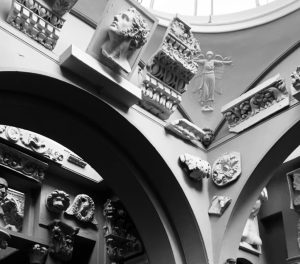Athens doesn’t have skyscrapers. Due to strict zoning laws that prevent any building from obstructing the view of the Acropolis, the city simultaneously feels both incredibly open and claustrophobic. There are no buildings looming over you, so you can see plenty of sky, but at the same time, that means all the buildings and sidewalks are that much more squeezed together. But when you do get to some elevation, you can see a whole lot more than in other cities.
One morning during a trip to Greece with my school’s Classics department, we were walking toward the Areopagus, also known as the Rock of Ares, which is a sizable overlook on a hill next to the Acropolis. I opened my Bible app and began to read Acts 17, the chapter where Paul first enters Athens and gives a sermon at the Areopagus to the Greeks. It’s unclear whether Paul actually delivered the speech on or just near the rock, but I liked to imagine that he might have been at the same lookout spot that I was as he prepared to preach.
Luke sets up the scene by telling us that “while Paul was waiting for them in Athens, he was greatly distressed to see that the city was full of idols.” [1] It’s always comforted me to know that a man as joyful and optimistic as Paul felt this way when looking at the world. Despite this feeling, Paul began by looking for common ground with the new citizens he had observed. “‘People of Athens!’ he opens, ‘I see that in every way you are very religious. For as I walked around and looked carefully at your objects of worship, I even found an altar with this inscription: TO AN UNKNOWN GOD. So you are ignorant of the very thing you worship—and this is what I am going to proclaim to you.” [2] Bishop Robert Barron calls the Areopagus sermon a “masterclass in evangelization” because “moving through the culture of his time, (Paul) assimilates what he can and resists what he must.” [3]
Yet, even with a nuanced sermon being delivered by one of the church’s most famous evangelists, Luke records that while a few people believed Paul, it wasn’t overly effective. In fact, some of the listeners sneered at him, and Paul departed for Corinth shortly after. Athens is then not mentioned for the rest of the New Testament. There’s a good chance that Paul would’ve died thinking that Christianity in Athens would never take root. So reading this narrative atop the Areopagus, I was very moved by just how many churches I could see in the distance. Not just that, but all around the Areopagus there were ancient pagan sites that only remained as ruins, and next to many of them, you could see large churches standing tall. It was very powerful to think that the same idols that caused Paul to feel distressed were now all overtaken by churches that came from the seeds of his ministry, even if he was never around to see it.
It’s interesting how Luke seems to describe the members of the Areopagus as men who just waste their days talking about vanities. Luke’s entire account of Athens is unusually short, so it’s funny that he took the time to include the following description: “All the Athenians and the foreigners who lived there spent their time doing nothing but talking about and listening to the latest ideas.” [4] You can almost hear him rolling his eyes as he wrote it. It reminds me of a great quote by St. John Chrysostom, a fourth century archbishop and church doctor who describes vanity in one of the most unique ways I’ve ever heard. “Consider what comes of food, into what it is changed. Are you not disgusted at its being named? Why then be eager for such accumulations? The increase of luxury is but the multiplication of dung! For nature has her limits, and what is beyond these is not nourishment, but injury, and the increase of ordure.” [5]
In isolation, this might be a pretty depressing quote. Chrysostom seems to suggest that much of what we pursue in life, whether it actually be food and luxury or the vain talk at the Areopagus, is in fact a waste of time. Not just a waste of time, but an active multiplication of something bad. It’s like in the movie Inception when characters are described as getting stuck in dreams, where nothing they do matters, and they can become apathetic almost to the point of death. The plot revolves around characters creating little personalized items called totems, something like a coin or a spinning top, that can help them identify what is real and what isn’t. So if so much of what we do is just multiplying dung, what do we focus on to know what’s real?
Later in the same sermon series, Chrysostom says the following. “God made Heaven, and earth, and sea. Great works these, and worthy of His wisdom! But by none of these has He so powerfully attracted human nature to Himself, as by mercy and the love of mankind. For that indeed is the work of power and wisdom and goodness. But it is far more so that He became a servant. Do we not for this more especially admire Him? Are we not for this still more amazed at Him? Nothing attracts God to us so much as mercy. And the prophets from beginning to end discourse upon this subject.” [6]
He tells us to focus on the Incarnation and the mercy that flows from it. By prioritizing that, we can make sure we are spending our lives on what’s real and avoid the pitfalls described by Luke and Chrysostom. Going back to Paul’s sermon, we can see a nice parallel. “In the past God overlooked such ignorance, but now he commands all people everywhere to repent. For he has set a day when he will judge the world with justice by the man he has appointed. He has given proof of this to everyone by raising him from the dead.” [7] Paul knew what these men were used to talking about, and made sure to center his message on Jesus’ identity and actions.
I truly hope that one day I get to explore more of the locations from the Book of Acts, and walk by more of the geography that the early apostles visited as they preached. But in the meantime, as I try to avoid vain talk and multiplying dung, I’ll never forget visiting the Areopagus, and seeing the impact that was eventually had by preaching centered on Jesus and his mercy. Lord, give us the strength to do the same!
FOOTNOTES
1: Acts 17:16
2: Acts 17:22-23
3: https://www.wordonfire.org/articles/barron/paul-on-the-areopagus-a-master-class-in-evangelization/
4: Acts 17:21
5: Sermons on 2 Timothy
6: Sermons on 2 Timothy
7: Acts 17:30-31
Andrew Nachamkin ’24 is a Statistics and Classics double major from the Hudson Valley, NY. Ever since middle school he has been fascinated by church history and apologetics, and is grateful for Telos for giving him outlets to explore these topics. Outside of school, he enjoys Nintendo games and basketball. After graduation he will move to New York City to work in finance.





